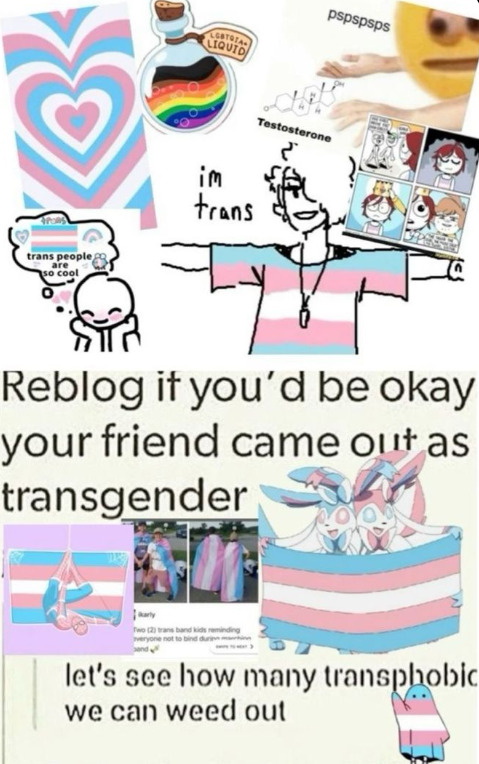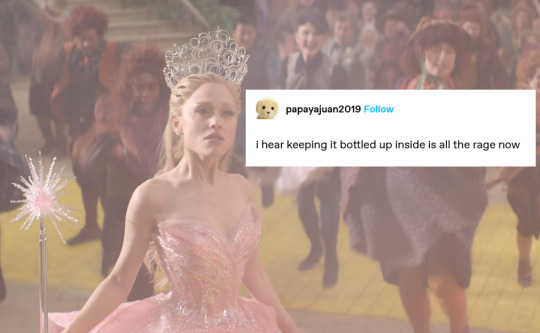Text

if you can't reblog, comment!
🏳️⚧️🏳️⚧️🏳️⚧️
7K notes
·
View notes
Text

when a house is both hungry and awake, every room becomes a mouth
8K notes
·
View notes
Text





glinda upland + text posts, NOMTW edition
841 notes
·
View notes
Text
Christ without HRT is just cis.
Trans Jesus confirmed
4K notes
·
View notes
Text
tbh the #1 thing that has helped me write consistently is reframing things from 'showing up to do the work' to 'finding time to do a hobby i enjoy' because that's literally what it is.
for whatever reason a lot of writing culture is centred around the idea that writing is torturous and difficult and everyone despises doing it but is compelled to do it anyway and that's a) nonsensical and b) a self-fulfilling prophecy. most people write because they like writing -- there are aspects of it that are exhausting and stressful but the hyperfocus we place on them kills the joy of the rest. also there's this weird tendency to see the completely normal and mundane desire to write as some sort of divine compulsion external to the writer, which is a problem because it leads to people fighting against it. idk. reminding yourself you like writing isn't magically going to make it easy, but it does help. telling yourself over and over again that you hate writing will hurt.
706 notes
·
View notes
Text
literally its so fun being abnormal about christianity and also being christian because i just said "id kiss judas with tongue" in front of my pastor and she squinted at me and went "do you need to be removed from council or are you going to be normal?"
50K notes
·
View notes
Text
“Average doctor commits 10 crimes a year” factoid actually just a statistical error. Average doctor commits 0 crimes per year. Crimes Gregory, who hates his supervisors and commits 27 crimes each shift, is an outlier adn should not have been counted.
4K notes
·
View notes
Text
we have GOT to kill tiktok/twitter self-censorship i just witnessed a grown adult say the word “smex” out loud to our professor
61K notes
·
View notes
Text
imagine how much of a fucking horrible person you have to be that on the first day your elected into office the crisis calls of a Suicide Prevention Project Go Up 33%. The Trevor Project Received over 1,400 Call By Early Monday Afternoon. Most of those calls, if not all, are coming from children. Children scared of you and what you will do. Imagine how much power and how horrible you have to be to do that.
30K notes
·
View notes
Text
"for good glinda would have got on the broom and for good elphaba would have considered staying"
yes, but consider that act ii glinda could bottom and act ii elphaba could top
382 notes
·
View notes
Text
Saying "But they're both pining for a man" against the theory that Glinda and Elphaba are lesbians for each other seems plausible for now but will turn out to be a Straw Man argument.
5K notes
·
View notes
Text
what do you mean elon musk did a nazi salute on live tv at the united states presidential inauguration twice and is now erasing the evidence off the internet by replacing the footage with the crowd cheering instead?

would be a shame if people reblogged this, wouldn’t it?
122K notes
·
View notes
Text

This dumbass just made everyone female
29K notes
·
View notes
Text
elon musk did a nazi salute twice at the inauguration, and republicans are defending him.
trump revoked executive order 11246, which prohibited discrimination.
trump put all dei employees on leave to be fired.
trump banned all lgbtq+ flags from being hung in government buildings.
trump rolled back biden’s executive order to lower prescription drug costs for people using medicare and medicaid.
trump rescinded the $35 cap on insulin, and prices are expected to rise to $1500 a month.
trump ordered the national institutes of health to cancel their review panels on cancer research.
trump ended the guidelines to prevent ai misuse. the guidelines prevent many things, but notably it prevents production of ai child pornography.
when sean hannity asked trump about the economy, he said “i don’t care”, after campaigning with the economy as his main talking point.
trump has withdrawn the us from the world health organization.
trump is ordering health agencies to stop reporting on bird flu and halt publications of scientific reports.
trump has pardoned over 1500 people who stormed the capitol on january 6th.
trump changed mount denali back to mount mckinley.
trump signed an executive order to rename the gulf of mexico to gulf of america.
trump shut down cbp one, an app which granted legal entry to 1 million+ immigrants.
trump is allowing ice raids at churches and elementary schools.
trump announced plans to declare a national emergency at the us-mexico border.
trump signed an executive order to expand the use of the death penalty.
trump disbanded the school safety board that works to prevent school shootings. it was comprised of survivors, educators, and gun violence prevention advocates and formed after the school shooting in parkland.
trump withdrew from the paris climate act.
trump revoked all protections for transgender troops in the us military.
trump rescinded executive orders made by biden that benefited and protected women, lgbtq+ people, black americans, hispanic americans, asian americans, native hawaiians, and pacific islanders.
trump is attempting to make it legal to refuse to hire or fire pregnant women.
multiple state legislators are drafting bills to allow the punishment for abortion to be the death penalty.
trump pardoned 23 individuals convicted under the freedom of access to clinic entrances (FACE) act for their anti-abortion activism, including oftentimes violent protests at abortion clinics.
trump signed an executive order allowing deportation of foreign students who they believe express support for hamas or hezbollah.
trump announced that the us government will from here on out only recognize male and female as sexes. intersex is not legally recognized anymore.
trump refused to swear on the bible during his inauguration. (i’ve gotten some comments about this specific point. i didn’t include it because i’m christian, because i’m not. i’m agnostic. i included it because he’s the first president in history to refuse to swear on ANYTHING, bible or not. in the bible it teaches that the only person who cannot touch the bible is the antichrist, yet that on TOP of everything else will never convince his followers that he’s unfit.)
andy ogles drafted a constitutional amendment to allow trump to be president for a third term.
georgia republican congressman mike collins called for the deportation of new jersey born mariann budde, the bishop who urged trump to “have mercy” on the lgbtq+ community and immigrants during a service at the national cathedral.
six states (arizona, idaho, iowa, kansas, mississippi, and north dakota) are planning on challenging obergefell v. hodges, which would end same-sex marriage nationwide. about a dozen more states have representatives who are also considering filing similar resolutions.
amazon revoked protections for lgbtq+ and black employees.
every single republican told us we were overreacting. trump swore he had nothing to do with project 2025 yet continues implementing details outlined in it. not a single person has the right to tell us we’re being dramatic anymore.
hope “cheaper eggs and gas” was worth it.
51K notes
·
View notes
Text
No, because what do you mean Arcane has completely rewritten the rulebook on queer representation in media, and it did it so effortlessly that it puts so many other shows to shame. Like, how are you going to tell me this animated series—ostensibly a spin-off of a video game—has given us some of the most nuanced, unapologetically powerful sapphic characters ever without reducing them to stereotypes, side plots, or, worse, trauma porn?
Vi and Caitlyn? Their dynamic is ELECTRIC. You’ve got Vi, the rough-edged, fiercely loyal, scrappy brawler with a tender side that could wreck anyone emotionally, and Caitlyn, the sharp, principled, deeply empathetic enforcer with a heart of gold. The way their relationship is built on mutual respect and trust while navigating all the insane, tragic chaos around them? Literal chef's kiss. And not once do we get the tired, lazy "coming out" narrative or the "but what about the gays?" rhetoric. Their queerness isn’t the story—it’s just a beautifully natural part of who they are. And THAT is revolutionary.
And let’s not even stop there. This show handles gender like it’s been waiting for everyone else to catch up. Characters like Sevika, who could give you chills with her sheer badassery and gender-nonconforming energy, exist unapologetically without the narrative ever feeling the need to spoon-feed us explanations. It’s just there, woven seamlessly into the fabric of the world.
So many shows claim to want to "normalize" queer relationships or push the envelope, but Arcane has quietly dominated the space by just writing characters who feel authentic. Their struggles are about class, power, loyalty, trauma, not token representation or forced diversity. This show said, “We’re just going to make some of the most layered, compelling characters you’ve ever seen—and oh yeah, some of them are gay. Keep up.”
Like, the bar wasn’t just raised—it was launched into the stratosphere. What do you mean this level of representation isn’t the norm yet? Arcane said, “We’re not asking for permission to exist. We’re just existing.” And that? That is art.
13K notes
·
View notes




